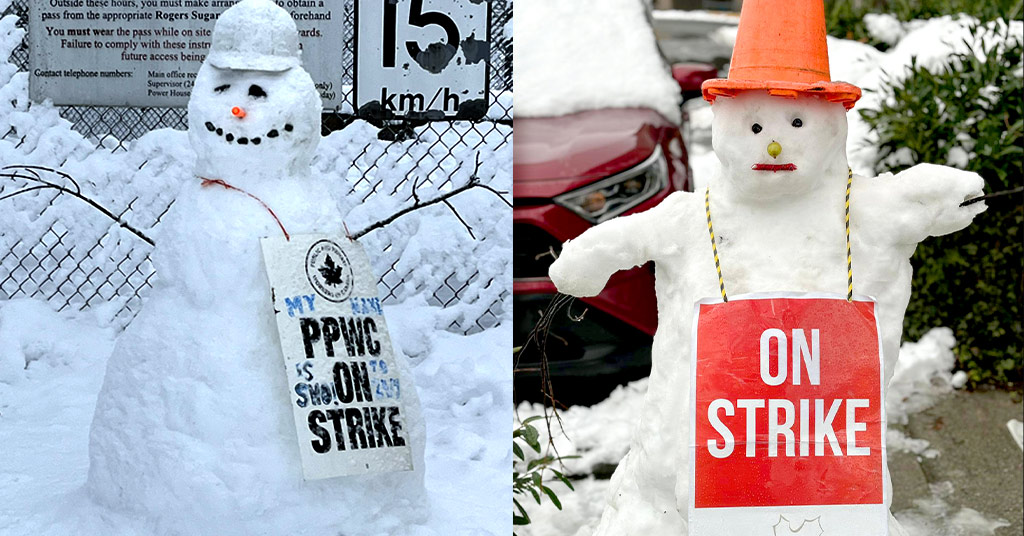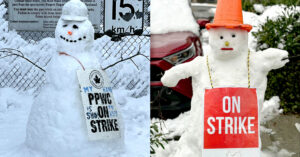
Striking Workers Across Canada Are Braving Deep Freeze Weather For Better Wages and Working Conditions
Workers share tips for surviving winter strikes in Canada
As a polar vortex sweeps across Canada, striking and locked out workers on at least 10 picket lines around the country are being impacted by severe and freezing weather.
Winter picket lines have always been an integral part of Canadian labour relations. So how do workers muster the strength to walk picket lines daily in the Canadian winters?
PressProgress spoke to workers across Canada for tips on how to survive a winter strike.
Preparation is Key
Tyson Boyd was a SEIU strike captain for the Pete’s Frootique picket line in Halifax which ran for nearly two months from November 18 to January 5. Though the workers had to strike over the holidays, they were able to win their first collective agreement.
Preparation is key, Boyd explains, especially if workers have never been on strike before.
Picket lines are up at @Sobeys owned @PetesNS! Come to tomorrow’s solidarity rally at 1pm! #PetesOnStrike #GreedySobeys #5CentsNotEnough #FairWages #SEIU #Halifax https://t.co/qtHOzo1YTU pic.twitter.com/lfASiyd0Si
— SEIU Local 2 (@seiulocal2can) November 18, 2023
“Know ahead of time that the process of being on strike isn’t going to feel good every day, because it can be hard and alienating work, so make a plan to get moral support from each other, because you know best what you’re all going through,” Boyd told PressProgress.
“The cold drives workers off the line, the wind blows away flyers and banners, and the rain and snow can soak provisions and equipment.”
Like any other Canadian winter excursion, dressing appropriately and in layers are crucial for hours outside.
“Ideally, you will have a set of long johns underneath whatever outfit you like under a thick sweater and a top coat,” Boyd advised. “The cold will creep in through your extremities, so boots, thick socks, a toque, mittens, and reusable hand-warmers are essential.”
Emily Mackinley, another SEIU strike captain, notes that tissues become necessary when the cold clogs so many noses. Having extra socks, gloves and scarves on hand is also useful if any workers forget to bring their own.
For snacks, Boyd recommends protein bars, trail-mix and easy fruit like bananas.
“Don’t bother with Timbits because without fail a kind stranger will bring you more Timbits than you can handle at some point.”
Coffee is a must, but cools down quickly.
“With the coffee, one thing I wish we had is a way to keep it warm, so a big insulated coffee thermos or something would go a long way,” Mackinley adds.
Having a designated place workers can warm up and a transportation schedule is crucial, Boyd adds.
Not bad… pic.twitter.com/qw9RRGAp6F
— Rogers Sugar Strike Watch (@SugarStrike2023) January 20, 2024
Shelter from the storms
On some picket lines, workers can set up tents and trailers on site to keep warm, cook food and store supplies like signs and water jugs. Shelter is especially useful if you’re running a 24 hour picket line, like Rogers’ Sugar workers in Vancouver, BC.
Rogers Sugar workers have been on strike for three months fighting to keep eight hour shifts instead of 12 hour shifts. The plant runs at all hours, so workers take picket shifts throughout the night.
Public and Private Workers of Canada Local 8 strike captain Dan Hardie has worked at the plant for 22 years. It’s his and his whole team’s first time on strike. He’s learned a few things about strike logistics.
“Make sure that you use some weight to strap the tent down or to lock it down,” Hardie told PressProgress. “Because we did have ours blow over and flip right upside down on us at one point with a pretty strong wind.”
Chili is a popular meal at winter strikes across Canada. Like coffee, chili is best when kept hot. The Rogers’ Sugar workers have a portable stove where they’re able to cook chili on the line and a propane fire pit to share meals around.
“Anything like a super hot stew or chili, you can make right there and keep it running on a low temperature to keep it nice and hot for the guys.”
CUPE Ontario commends the CUPE 1490 members in the Town of Black-River Matheson who bravely voted NO to the forced vote by the employer on the offer that fell short on all fronts ✊🏾👏🏽
These locked out members continue to hold the line and say “Enough is Enough”!
Read the full… pic.twitter.com/8qznGUQwre
— CUPE Ontario (@CUPEOntario) January 19, 2024
Getting to know your co-workers
When you’ve got all the material you need to stay fed and warm, you need ways to pass the time. This has resulted in a level of friendship and bonding among workers that was hard to achieve inside the plant.
“My job entails that I do a lot of work by myself when I’m inside the plant. So when they hire the new guys, I never get to meet them,” Hardie said. They’ll walk by me and say hi, but I’ve never spent time talking to them, so you don’t really know who you’re dealing with.”
Walking the picket line has facilitated conversations among multiple generations of workers, with the older workers able to share stories about life inside and outside the plant with younger workers.
When the weather was nicer, workers would throw around a football or frisbee to pass the time. Now that the weather’s become colder, street hockey is the game of choice.
“There’s actually been a tremendous amount of bonding going on with everybody here,” Hardie added. “I’ve even got a few guys calling me uncle Dan, some of the young guys.”
Hardie was also among those who volunteered to take some Christmas picket shifts so some of the younger workers could spend time with their families.
“The young guys are the ones that are going to keep the place going,” Hardie says. “It’s a scary thing for a lot of people to be walking out knowing that they’re going to be without an income. But you’re doing it for the better of yourself and for your futures – everybody’s futures.”
The Rogers Sugar workers have also bonded with members of the local community, such as an injured goose who visits the picket line frequently. The workers have named the goose Reginald Striker.
“Reginald is probably one of the biggest morale keepers around here.”
“He comes cruising by everyday couple of times a day and hangs out for an hour, two hours with us sometimes sits down and it’s it’s hilarious, actually.
From the picket line:
Reginald Striker takes a brave stand against scabs.
While his behaviour is technically illegal, he acts anyway, answering to a higher moral calling. pic.twitter.com/JgDwp1N37E
— Rogers Sugar Strike Watch (@SugarStrike2023) January 8, 2024
Community connections
For locked-out municipal workers in the rural Ontario town of Black River-Matheson, shoveling driveways of nearby neighbors after heavy snowfalls helps workers pass the time and connect with the community.
Tom Pullen, a heavy equipment operator and member of the CUPE 1490 bargaining committee, shared how the community has helped the workers get through the ongoing winter lockout.
“There’s a few driveways of some ladies that we go and clean their driveways out and they bake for us and whatnot. It’s great,” Pullen told PressProgress.
“Back when we’re at work they would bring us baked goods,” Pullen said. “But since we’re out there I guess they’re bringing us actual meals.”
“They’ve been bringing us a bowl of chili one day, they made a lasagna, soup.”
The Black River-Matheson workers, members of CUPE 1490, have been locked out since October 15 fighting a two tier wage system. The workers have set up a small lodge with a wood stove to keep themselves and the food warm.
“If we get a big soup or whatever, the next day someone will take it home and bring it back and then we can just warm it back up,” Pullen explains.
“The support from the community has been great. It’s been awesome. I can’t thank them enough for that.”
Our journalism is powered by readers like you.
We’re an award-winning non-profit news organization that covers topics like social and economic inequality, big business and labour, and right-wing extremism.
Help us build so we can bring to light stories that don’t get the attention they deserve from Canada’s big corporate media outlets.
Donate



